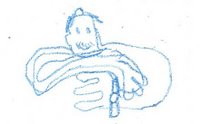Otro año nuevo ::: Another New Year
Año a año por estos días, con ciega ilusión, con fe que algunos llamarían admirable, nos deseamos mutuamente felicidad y prosperidad para el año que viene. Lo hacemos porque sabemos, aunque no lo admitamos, lo imposible de alcanzar una y lo improbable de mantener la otra. Son buenos deseos que rara vez se cumplen y por lo mismo han de repetirse año a año, como una fórmula mágica, con la insistencia y constancia de la desesperación, en estas fechas de recuento de lo ya pasado y de esperanza en un futuro que, al fin y al cabo, es siempre el mismo, el mismísimo de ayer y de mañana.
Es el espíritu optimista el que se impone al fin del año; la voluntad humana de superar las dificultades diarias y celebrar, contra viento y marea, con pitos y sonajas, abrazos y champaña, lo que se tiene y se es: la vida.
Huyan, nos decimos, al ruido de la celebración, a los petardos de los fuegos de fantasía y a los brindis, los demonios de la desesperanza y por unas horas se abata el paso apresurado del tiempo y su constancia de obstinado.
El pesisimista, el aguafiestas, por su parte, no acaba de entender ante el barullo de las fiesta cómo pueden los otros, los ilusos, cumplir con el ritual anual de la esperanza.
:::::::::
Year after year around these days, with blind illusion, with a faith some would call admirable, we wish one another happiness and prosperity for the new year. We do it because we know, although we might not admit it, that one of them is unreachable and the other is probably impossible to maintain. They are good wishes which rarely are fulfilled; and because of it we have to repeat them year after year, like a magic formula and with the insistence of desperation, in these days of reviewing the past and wishing for a future which, after all, will always be the same, exactly the same that was yesterday and will be tomorrow.
The spirit of optimism prevails at the end of the year; the human will to surmount
the daily difficulties and to celebrate, against all odds, with noise, with hugs and champaigne, what we have and we are: life.
Go away, we say, demons of despair. Let the noise of celebration, the rockets of fancy lights, the raised glasses scare them away. Let time for a few hours forget its hurried pace and its obstinate continuity.
The pessimist, the one that kills the joy of any celebration, cannot understand how the others, the naive ones, are able to celebrate with such joyful partying the annual ritual of hope.



